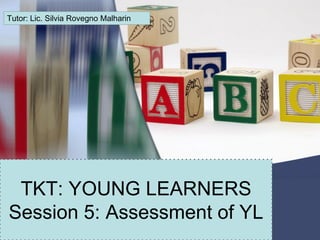TKT Young Learners: Assessment
•
10 likes•3,321 views
What do we assess How When Why
Report
Share
Report
Share
Download to read offline

Recommended
More Related Content
What's hot
What's hot (20)
Similar to TKT Young Learners: Assessment
Similar to TKT Young Learners: Assessment (20)
Principles of Language Assessment: Assessment Terminology

Principles of Language Assessment: Assessment Terminology
Learning_activity1_Navarro Luzuriaga_Joseph Andrés.pptx

Learning_activity1_Navarro Luzuriaga_Joseph Andrés.pptx
More from Silvia Rovegno Malharin
Ideas on how to help sts and minimize problems in the classroomOld challenges, New solutions: how to reach all of your sts and make them shine

Old challenges, New solutions: how to reach all of your sts and make them shineSilvia Rovegno Malharin
More from Silvia Rovegno Malharin (17)
Estrategias Inclusivas en el Aula de Lenguas Extranjeras

Estrategias Inclusivas en el Aula de Lenguas Extranjeras
Dyslexic language learners: are we truly catering for their needs?

Dyslexic language learners: are we truly catering for their needs?
Old challenges, New solutions: how to reach all of your sts and make them shine

Old challenges, New solutions: how to reach all of your sts and make them shine
Google applications to enhance writing instruction

Google applications to enhance writing instruction
Students with dyslexia learning English? Yes, they can!

Students with dyslexia learning English? Yes, they can!
How should we teach grammar? or should we teach grammar at all?

How should we teach grammar? or should we teach grammar at all?
Planning effective lessons and courses for Secondary

Planning effective lessons and courses for Secondary
Planning effective lessons and courses for primary

Planning effective lessons and courses for primary
Recently uploaded
https://app.box.com/s/x7vf0j7xaxl2hlczxm3ny497y4yto33i80 ĐỀ THI THỬ TUYỂN SINH TIẾNG ANH VÀO 10 SỞ GD – ĐT THÀNH PHỐ HỒ CHÍ MINH NĂ...

80 ĐỀ THI THỬ TUYỂN SINH TIẾNG ANH VÀO 10 SỞ GD – ĐT THÀNH PHỐ HỒ CHÍ MINH NĂ...Nguyen Thanh Tu Collection
Recently uploaded (20)
Salient Features of India constitution especially power and functions

Salient Features of India constitution especially power and functions
HMCS Max Bernays Pre-Deployment Brief (May 2024).pptx

HMCS Max Bernays Pre-Deployment Brief (May 2024).pptx
80 ĐỀ THI THỬ TUYỂN SINH TIẾNG ANH VÀO 10 SỞ GD – ĐT THÀNH PHỐ HỒ CHÍ MINH NĂ...

80 ĐỀ THI THỬ TUYỂN SINH TIẾNG ANH VÀO 10 SỞ GD – ĐT THÀNH PHỐ HỒ CHÍ MINH NĂ...
Beyond_Borders_Understanding_Anime_and_Manga_Fandom_A_Comprehensive_Audience_...

Beyond_Borders_Understanding_Anime_and_Manga_Fandom_A_Comprehensive_Audience_...
Food safety_Challenges food safety laboratories_.pdf

Food safety_Challenges food safety laboratories_.pdf
Plant propagation: Sexual and Asexual propapagation.pptx

Plant propagation: Sexual and Asexual propapagation.pptx
This PowerPoint helps students to consider the concept of infinity.

This PowerPoint helps students to consider the concept of infinity.
Unit 3 Emotional Intelligence and Spiritual Intelligence.pdf

Unit 3 Emotional Intelligence and Spiritual Intelligence.pdf
General Principles of Intellectual Property: Concepts of Intellectual Proper...

General Principles of Intellectual Property: Concepts of Intellectual Proper...
UGC NET Paper 1 Mathematical Reasoning & Aptitude.pdf

UGC NET Paper 1 Mathematical Reasoning & Aptitude.pdf
TKT Young Learners: Assessment
- 1. Presentation Title TKT: YOUNG LEARNERS Session 5: Assessment of YL Tutor: Lic. Silvia Rovegno Malharin
- 2. Session outline • Key terms in assessment • Areas of assessment • Purposes of assessment • Assessment focus • Acting on assessment evidence • Round-off TKT YL
- 4. Key terms: Can you name the term?
- 5. 1. A type of testing which is different from a final examination. Some or all of the work that learners do during a course is considered by the teacher on a regular basis and contributes to the final grade given to learners. May also include regular monitoring of classroom performance and contribution. Continuous assessment
- 6. 2. When a teacher judges learners’ work through a test and then gives a formal report or grade to learners, to say how successful or unsuccessful they have been. Formal assessment
- 7. 3. When a teacher uses information on learners’ progress during a course to adapt their teaching or to give learners feedback on their learning. Formativeassessment
- 8. 4. When a teacher decides whether a learner is doing well or not, or whether a course is successful or not, by observing learners rather than setting a test or writing an official report or giving a grade. Informal assessment
- 9. 5. When learners give feedback on each other’s language, work, learning strategies, performance Peer assessment
- 10. 6. When learners decide for themselves how good they think their progress or language use is. Self-assessment
- 11. 7. Sentences that describe language learners’ language use or an aspect of it on a scale of proficiency, Can-do statements
- 12. 8. X is used to see how well learners have learned the language and skills taught in class. Achievement test
- 13. 9. X is used to identify problems that learners have with language or skills. Diagnostic test
- 14. 10. X is used to see how good learners are at using the target language. The contents of a ……are not chosen according to what has been taught, but according to what is needed for a particular purpose Proficiency test
- 16. What is classroom based assesement? ✓ Assessment is a systematic process of gathering information about what a student knows, is able to do, and is learning to do. ✓ Assessment information provides the foundation for decision-making and planning for instruction and learning. ✓ Assessment is an integral part of instruction that enhances, empowers, and celebrates student learning ✓ Classroom-based assessment provides regular feedback and allows teachers and students to reflect on progress and adjust instruction and learning accordingly.
- 18. How do we assess learning? ❖ observing behaviour ❖ listening to oral work ❖ asking learners their opinions ❖ through self-assessment tasks ❖ correcting written work ❖ using checklists
- 22. Purposes of assessment Why do we assess?
- 23. Task: are the statements true or false?
- 25. Acting on assessment evidence Matching task
- 26. Round off!
